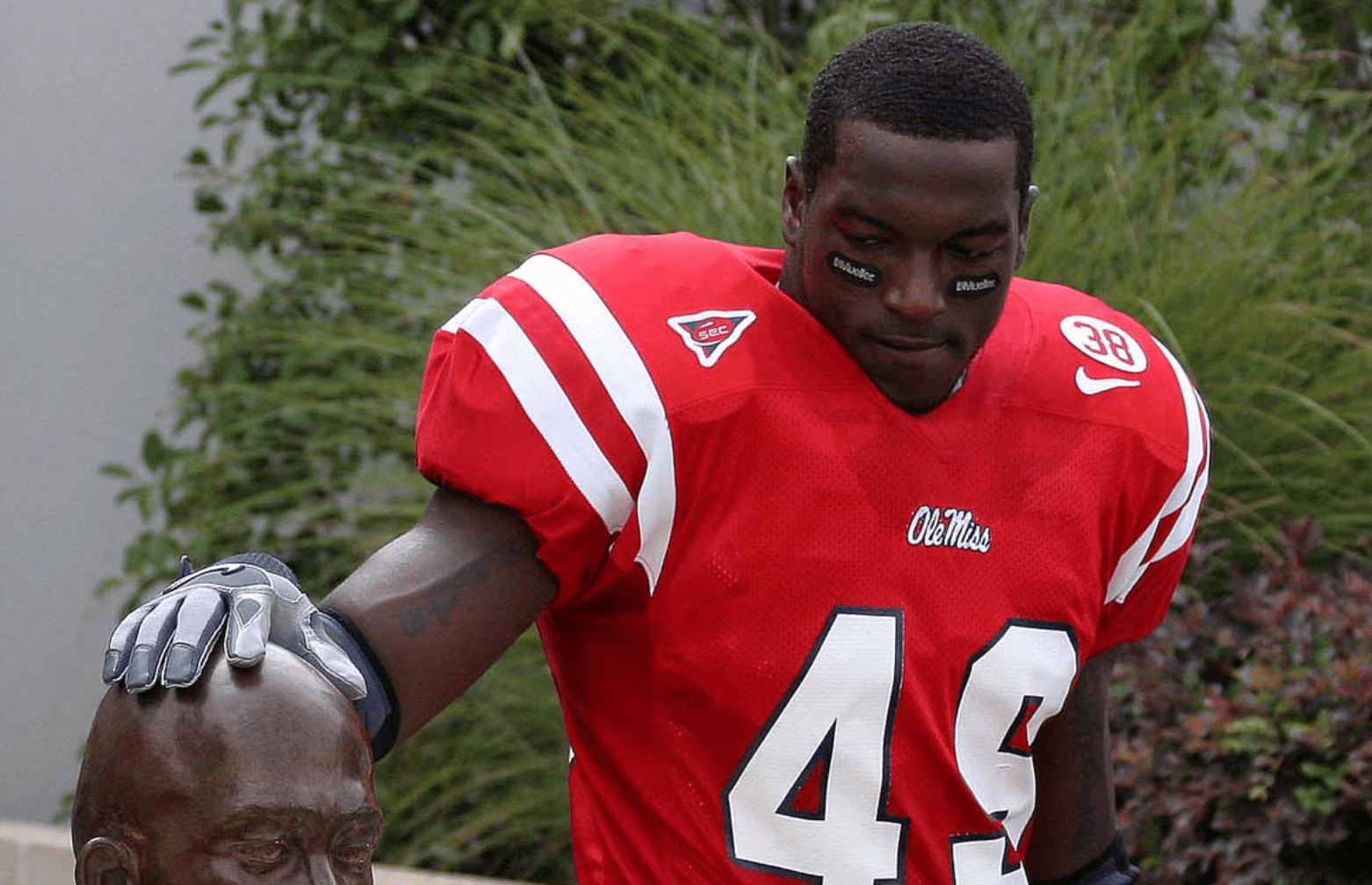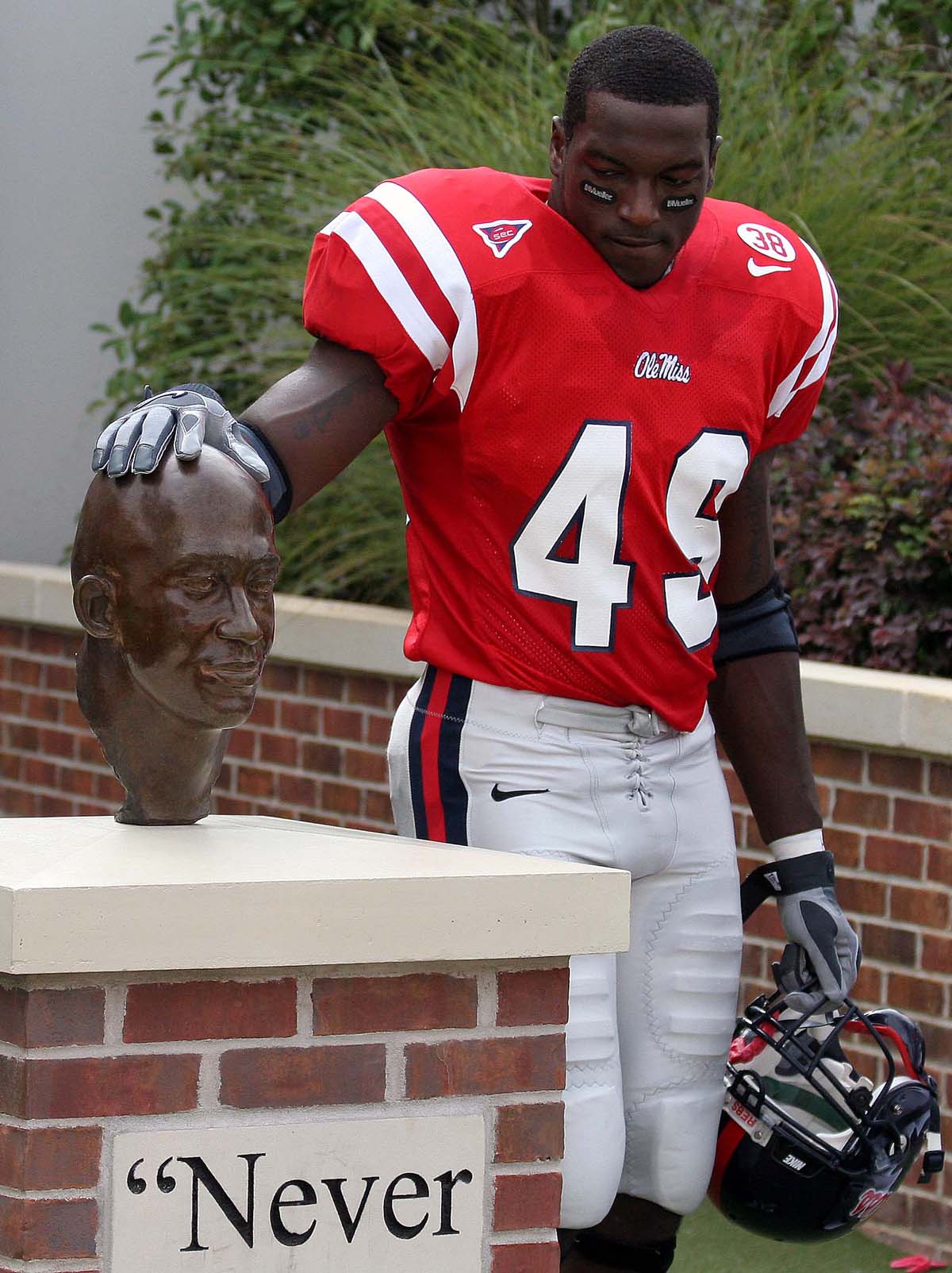Mississippi Today
It did not take long for Hall of Famer Patrick Willis to make an impression


Patrick Willis, the best linebacker I ever covered, made a lasting impression the first time I saw him. It was Oct. 18, 2003. He was an 18-year-old freshman at Ole Miss.
Willis was a lightly recruited linebacker from Tennessee who did not even receive an offer from his home state Volunteers. His other Division I offer was from Memphis. Indeed, I don't think I had ever heard his name called until Ole Miss kicked off to Alabama to begin the game at Vaught-Hemingway Stadium. Alabama's Ramzee Robinson, one of those legions of fleet-footed, sturdy Crimson Tide defensive backs we've seen through the years, gathered in the kickoff at his own 10-yard line. He probably thought he was just getting started when he reached the 17-yard line. He was wrong.
As I wrote that day, “…Freshman Patrick Willis hit him like a speeding pickup truck. Wham! Robinson went backwards. It was the first of many whams!”
It set the tone for the day. Willis and his Rebel teammates played the first quarter as if they were flying, took a 24-0 lead and clocked Alabama 43-28. Afterward, David Cutcliffe, the Rebels coach said, “Hitting like that can be contagious.”

Now, I'm not going to sit here and write that I knew then that Patrick Willis was going to be a College Football Hall of Famer (inducted in 2019) or a Pro Football Hall of Famer (announced Thursday), but I did know I was watching someone special. It's not often you see an Alabama runner, at full speed, slammed a couple yards backwards. Usually, it's the other way around.
But Willis hit like that for four seasons at Ole Miss, the last three on losing football teams. He was anything but a loser. He was twice a first team All American, twice All-SEC. He led Ole Miss in tackles as a sophomore and led the SEC as a junior and senior. He won the Butkus and Lambert and Conerly trophies.
If you watched Ole Miss often during those four seasons, you saw him do what he did to Ramzee Robinson to backs from LSU, Auburn, Arkansas, Tennessee and anyone else the Rebels played. He really was the perfect linebacker: big, strong, fast, quick and remarkably instinctive.
Off the field, he was a thoughtful and respectful gentleman, even in the worst of times. And there were plenty of those his last two years under Ed Orgeron. I particularly remember when Jerious Norwood ran for 204 yards and four touchdowns in State's Egg Bowl victory over Ole Miss in Willis's junior season. It probably won the Conerly Trophy for Norwood and lost it for Willis, who made 15 tackles and intercepted a pass that day. Willis gave credit where it was due, calling Norwood “the best back I've faced.”
Willis' excellence and demeanor was all the more remarkable when you considered his childhood. He grew up in poverty, working in cotton fields to earn money to feed younger siblings. When his alcoholic father became abusive, he and his siblings moved in with Willis' high school basketball coach. Nevertheless, Willis was All-State in football both as a running back and linebacker and also played basketball and baseball.
You may remember that Willis was considered a late first round or early second round draft choice following his senior season, but then blew up during postseason workouts, all-star games and the NFL combine. At 240 pounds, he ran a 4.38 40-yard dash on Ole Miss Senior Day. At the combine, his vertical leap was measured at 39 inches. He was the defensive MVP in the Senior Bowl. The San Francisco 49ers made him the 11th pick of the draft.
And, of course, he was the defensive Rookie of the Year in the NFL. As a rookie, he was coached by Pro Football Hall of Famer Mike Singletary, who said, “I've already coached two of the greatest linebackers, one who has already proven to be one of the greatest (Ray Lewis) and one who will be (Patrick Willis).”
Willis a first team All-Pro six times in an eight-year NFL career and played in seven Pro Bowls. His retirement announcement in 2015, at the age of 30, was stunning. He left a $22 million contract on the table. When you hit as hard as Willis hit, there are aches and pains that come with it. Like running back greats Jim Brown, who retired at 29, and Barry Sanders, who retired at 30, Willis retired with his health intact. He earned nearly $50 million as a pro. How much money does one guy need?
He has his health, plenty of money and a spot in Canton, Ohio, as one of the greatest linebackers to ever play the game.
This article first appeared on Mississippi Today and is republished here under a Creative Commons license.
Mississippi Today
Renada Stovall, chemist and entrepreneur
Renada Stovall sat on the back deck of her rural Arkansas home one evening, contemplating life when she had a life-altering epiphany…
“I gotta get out of these woods.”
She heard it as clear as lips to her ear and as deep as the trees surrounding her property. Stovall's job as a chemist had taken her all over the country. In addition to Arkansas, there were stints in Atlanta, Dallas and Reno. But she was missing home, her parents and friends. She also knew, she needed something else to do.
“I thought, what kind of business can I start for myself,” said Stovall, as she watered herbs growing in a garden behind her south Jackson home. Some of those herbs are used in her all-natural products. “I know when I lived in Reno, Nevada, where it's very hot and very dry, there really weren't products available that worked for me, my hair, and my skin suffered. I've got a chemistry degree from Spelman College. I took the plunge and decided to create products for myself.”

In 2018, Stovall's venture led to the creation of shea butter moisturizers and natural soaps. But she didn't stop there, and in December 2022, she moved home to Mississippi and got to work, expanding her product line to include body balms and butters, and shampoos infused with avocado and palm, mango butter, coconut and olive oils.
Nadabutter, which incorporates Renada's name, came to fruition.

Stovall sells her balms and moisturizers at what she calls, “pop-up markets,” across the state during the summer. She's available via social media and also creates products depending on what of her ingredients a customer chooses. “My turmeric and honey is really popular,” Stovall added.
“The all-natural ingredients I use are great for conditioning the skin and hair. All of my products make you feel soft and luscious. The shea butter I use comes from West Africa. It's my way of networking and supporting other women. And it's my wish that other women can be inspired to be self-sufficient in starting their own businesses.”





This article first appeared on Mississippi Today and is republished here under a Creative Commons license.
Mississippi Today
On this day in 1954
MAY 17, 1954

In Brown v. Board of Education and Bolling v. Sharpe, the U.S. Supreme Court unanimously ruled that the “separate but equal” doctrine in Plessy v. Ferguson was unconstitutional under the 14th Amendment, which guaranteed equal treatment under the law.
The historic decision brought an end to federal tolerance of racial segregation, ruling in the case of student Linda Brown, who was denied admission to her local elementary school in Topeka, Kansas, because of the color of her skin.
In Mississippi, segregationist leaders called the day “Black Monday” and took up the charge of the just-created white Citizens' Council to preserve racial segregation at all costs.
This article first appeared on Mississippi Today and is republished here under a Creative Commons license.
Mississippi Today
Every university but Delta State to increase tuition this year
Every university in Mississippi is increasing tuition in the fall except for Delta State University.
The new rates were approved by the governing board of the eight universities, the Institutions of Higher Learning Board of Trustees, at its regular meeting Thursday.
The average cost of tuition in Mississippi is now $8,833 a year, a roughly 3% increase from last year. Students can expect to pay tuition ranging from $7,942 a year at Mississippi Valley State University to $10,052 a year at Mississippi State University.
In recent years, universities have cited inflation and rising insurance costs as reasons for the tuition increases. At Thursday's meeting, the board heard a presentation on how property insurance is becoming more expensive for the eight universities as Mississippi sees more tornadoes and storms with severe wind and hail.
READ MORE: Tuition increases yet again at most public universities
But it's an ongoing trend. Mississippi's public universities have steadily increased tuition since 2000, putting the cost of college increasingly out of reach for the average Mississippi family. More than half of Mississippi college students graduated with an average of $29,714 in student debt in 2020, according to the Institution for College Access and Success.
At Delta State University, the president, Daniel Ennis, announced that he will attempt to avoid tuition increases as the regional college in the Mississippi Delta undergoes drastic budget cuts in an effort to become more financially sustainable.
“We will resist tuition increases so that our most economically vulnerable students can continue to have access to the opportunities that a college degree can provide,” he wrote in a memo to faculty and staff on Monday. “We will move beyond basic survival and into a place where we have the capacity to take better advantage of our undeniable strengths.”
Delta State didn't increase tuition last year, either. Officials have been concerned the university is becoming too pricey for the students it serves.
Tuition for the 2024-25 academic year, by school:
- Alcorn State University: $8,105
- Delta State University: $8,435
- Jackson State University: $8,690
- Mississippi State University: $10,052
- Mississippi University for Women: $8,392
- Mississippi Valley State University: $7,492
- University of Mississippi: $9,612
- University of Southern Mississippi: $9,888
This article first appeared on Mississippi Today and is republished here under a Creative Commons license.
-
SuperTalk FM5 days ago
Martin Lawrence making 3 stops in Mississippi on comedy tour
-
Our Mississippi Home4 days ago
Beat the Heat with Mississippi’s Best Waterparks
-
Our Mississippi Home5 days ago
Charlie’s U-Pik: Opening Soon for the Summer Season
-
Mississippi News Video7 days ago
Local dentists offer free dental care in Amory
-
SuperTalk FM18 hours ago
State auditor cracking down on Mississippians receiving unemployment benefits
-
Mississippi News Video3 days ago
Jackson has a gang problem
-
Kaiser Health News4 days ago
Medicaid ‘Unwinding’ Decried as Biased Against Disabled People
-
Mississippi Today7 days ago
On this day in 1968





































